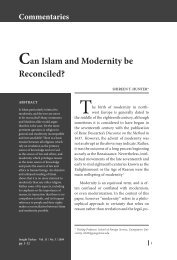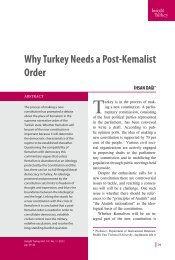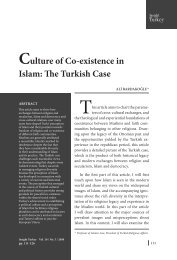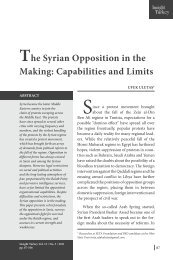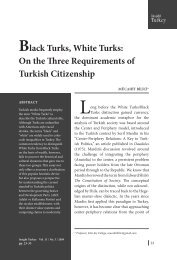ÖDÜL CELEPlitical party traditions in <strong>Turkey</strong>. This study focuses on <strong>the</strong> causes of this divergencewith a reference to <strong>the</strong> political history <strong>and</strong> ideology of <strong>the</strong> conservative <strong>and</strong>nationalist movements in <strong>the</strong> country. In fact, AKP <strong>and</strong> MHP are not ideologicaladversaries as both share an ideology <strong>and</strong> discourse nourished by conservatism<strong>and</strong> nationalism in <strong>the</strong> Turkish political context. Both parties have a significantlyhigh vote share potential among <strong>the</strong> traditionally right-wing electorates.Never<strong>the</strong>less, <strong>the</strong>re are significant disparities between <strong>the</strong> two party traditionsthat lead <strong>the</strong>m to taking opposite sides on <strong>the</strong> democratic opening issue. AKP has amore recent history because it was founded as a new party in 2002, not a successorof a formerly existing party. In contrast, MHP’s history goes back to <strong>the</strong> mid-1960s.AKP comprises a variety of right-wing groups <strong>and</strong> defines itself as ‘conservativedemocrat’ while MHP’s primary premise is Turkish nationalism. Some of AKP’sformer members, including its leader Erdoğan, come from <strong>the</strong> former pro-Islamistmovement, which has been more tolerant towards ethnic <strong>and</strong> linguistic differencesin <strong>Turkey</strong>. On <strong>the</strong> contrary, MHP has been relatively cautious towards diversity issuesdue to its ethno-nationalist ideological roots. This primary difference forms <strong>the</strong>basis of <strong>the</strong> AKP-MHP controversy on <strong>the</strong> democratic opening. While AKP perceives<strong>the</strong> opening as a democratic progress <strong>and</strong> a means by which <strong>Turkey</strong>’s <strong>Kurdish</strong>question can be resolved, MHP sees <strong>the</strong> opening as a sign of <strong>the</strong> AKP government’sweakness in dealing with terrorism <strong>and</strong> establishing law <strong>and</strong> order in <strong>the</strong> country.According to MHP’s active politicians, <strong>the</strong> opening serves nei<strong>the</strong>r democratizationnor reconciliation on <strong>the</strong> <strong>Kurdish</strong> issue in <strong>Turkey</strong>. On <strong>the</strong> contrary, <strong>the</strong>ybelieve that <strong>the</strong> opening disturbs <strong>the</strong> existing fusion between ethnic communities.In fact, MHP acted toge<strong>the</strong>r with AKP on several issues that appealed to <strong>the</strong> traditionalright-wing voters, such as changing <strong>the</strong> dress code on university campusesto allow for wearing headscarf as well as <strong>the</strong> election of Abdullah Gül as <strong>the</strong> President.<strong>The</strong>se strategies helped MHP get <strong>the</strong> appreciation of AKP’s conservative votersto a large extent. If <strong>the</strong> opening becomes successful in resolving <strong>the</strong> <strong>Kurdish</strong>issue <strong>and</strong> if <strong>the</strong> public embraces its consequences, MHP may have a harder timein justifying its cause in opposing <strong>the</strong> opening. If <strong>the</strong> opening fails, however, MHPmay benefit electorally from <strong>the</strong> traditional right-winger voters who are or will bedisappointed with <strong>the</strong> democratic opening <strong>and</strong> its architect, AKP.Endnotes1. Cengiz Ç<strong>and</strong>ar, “<strong>The</strong> <strong>Kurdish</strong> Question: <strong>The</strong> Reasons <strong>and</strong> Fortunes of <strong>the</strong> ‘Opening’,” <strong>Insight</strong><strong>Turkey</strong>, Vol. 11, No. 4 (October-December, 2009), p. 13.2. Several districts <strong>and</strong> subdistricts with <strong>Kurdish</strong> <strong>and</strong> o<strong>the</strong>r non-Turkish names were renamedin Turkish in <strong>Turkey</strong>’s recent history.140
<strong>Turkey</strong>’s <strong>Radical</strong> <strong>Right</strong> <strong>and</strong> <strong>the</strong> <strong>Kurdish</strong> <strong>Issue</strong>3. <strong>The</strong>ir dem<strong>and</strong>s included ending <strong>the</strong> isolation of Öcalan <strong>and</strong> <strong>the</strong> village guard system, whichare regarded as excessive dem<strong>and</strong>s by not only <strong>the</strong> ultranationalists but also several mainstreampoliticians.4. Journal of Turkish Weekly website (November 15, 2009) http://www.turkishweekly.net.5. DP is a fringe center-right party, which claims <strong>the</strong> heritage of moderate conservatism in<strong>Turkey</strong>.6. Bekir Ağırdır, “S<strong>and</strong>ığın İçindekini Ne Belirledi: 22 Temmuz 2007 Seçim Analizi” [What DeterminedWhat’s Inside <strong>the</strong> Ballot Box: July 22, 2007 Election Analysis]. <strong>The</strong> entire study was publishedin <strong>the</strong> daily newspaper Radikal, July 25-28, 2007.7. Philip Robins, “<strong>The</strong> Overlord State: Turkish Policy <strong>and</strong> <strong>the</strong> <strong>Kurdish</strong> <strong>Issue</strong>,” International Affairs,Vol. 69, No. 4 (October, 1993), p. 675.8. Mesut Yeğen, “<strong>The</strong> <strong>Kurdish</strong> Question in <strong>the</strong> Turkish State Discourse,” Journal of ContemporaryHistory, Vol. 34, No. 4 (October, 1999), p. 555.9. <strong>The</strong> National Pact (Misak-ı Milli) was <strong>the</strong> manifesto of <strong>the</strong> Turkish War of Independence.Containing six articles, <strong>the</strong> Pact laid out, in <strong>the</strong> wake of <strong>the</strong> war, <strong>the</strong> territorial boundaries of <strong>Turkey</strong>to be secured. Current borders of <strong>Turkey</strong> correspond, to a large extent, to those outlined in <strong>the</strong>National Pact.10. Such reforms include purification of Turkish from remnants of <strong>the</strong> Ottoman language <strong>and</strong>adoption of <strong>the</strong> Latin alphabet.11. C. J. Edmonds, “<strong>Kurdish</strong> Nationalism,” Journal of Contemporary History, Vol. 6, No. 1 (1971),p. 91.12. Aylin Güney, “<strong>The</strong> People’s Democracy Party,” Turkish Studies, Vol. 3, No. 1 (2002), p.124.13. <strong>The</strong>se two HEP deputies were Leyla Zana <strong>and</strong> Hatip Dicle.14. After HEP was closed down, <strong>the</strong> same political group founded <strong>the</strong> Democracy Party(Demokrasi Partisi, DEP) in 1993. After DEP was closed down in 1994, <strong>the</strong> People’s Democracy Party(Halkın Demokrasi Partisi, HADEP) was founded as a successor. HADEP was later succeeded by<strong>the</strong> Democratic People’s Party (Demokratik Halk Partisi, DEHAP) <strong>and</strong> <strong>the</strong> Democratic Society Party(Demokratik Toplum Partisi, DTP). After DTP’s recent closure, <strong>the</strong> same political group formed <strong>the</strong>Peace <strong>and</strong> Democracy Party (Barış ve Demokrasi Partisi, BDP).15. One of <strong>the</strong> initial right-wing politicians to acknowledge <strong>the</strong> ‘<strong>Kurdish</strong> reality’ was <strong>the</strong> formerPrime Minister <strong>and</strong> President, Süleyman Demirel. He openly used <strong>the</strong> phrase, “acknowledge <strong>the</strong><strong>Kurdish</strong> reality” in 1992, when he was <strong>the</strong> Prime Minister. See Robins, “<strong>The</strong> Overlord State: TurkishPolicy <strong>and</strong> <strong>the</strong> <strong>Kurdish</strong> <strong>Issue</strong>,” p. 666.16. Burak Arıkan, “Turkish Ultra-nationalists Under Review: A Study of <strong>the</strong> Nationalist ActionParty,” Vol. 8, No. 3 (July, 2002), p. 359.17. <strong>The</strong> election propag<strong>and</strong>a by MHP during <strong>the</strong> 1970s reveals its anti-communist priority at <strong>the</strong>time. In some of <strong>the</strong> election banners, MHP blames all o<strong>the</strong>r parties for being too soft or accommodatingtowards Communism <strong>and</strong> presents itself as <strong>the</strong> only party to ‘crush Communism.’ In ano<strong>the</strong>r,MHP presents itself as a party to ‘crush <strong>the</strong> red b<strong>and</strong>it.’ In this context, <strong>the</strong> ‘red b<strong>and</strong>it’ st<strong>and</strong>s forleft-wing revolutionaries.18. Jacob L<strong>and</strong>au, “<strong>The</strong> Nationalist Action Party in <strong>Turkey</strong>,” Journal of Contemporary History,Vol. 17, No. 4 (October, 1982), p. 594.19. <strong>The</strong> 1980 military regime developed a ten percent national threshold for <strong>the</strong> parties runningin elections to win representative seats. <strong>The</strong> purpose was to shrink <strong>the</strong> number of parliamentary141



